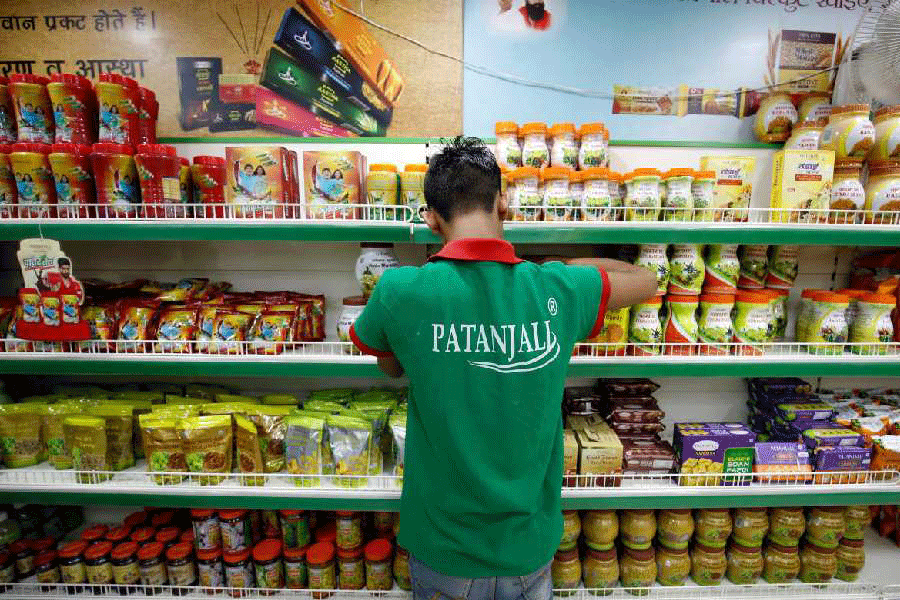Kerala’s Drugs Control Department has signalled its intention to prosecute Divya Pharmacy, the maker of Ramdev’s Patanjali Ayurved products, for misleading advertisements after what a complainant-doctor has called “a charade of inaction” by central and Uttarakhand authorities.
The department, acting on a complaint by Kannur-based ophthalmologist K.V. Babu, has documented 29 instances of advertisements that allegedly violated the Drugs and Magic Remedies (Objectionable Advertisements) Act 1954, the state’s top drug regulator has said.
The advertisements for Patanjali products had claimed that evidence-based ayurvedic medicines can “cure” high blood pressure and diabetes, among other illnesses. The DMR Act prohibits advertisements for cures for certain health disorders, including high blood pressure and diabetes.
“We have initiated legal proceedings on these ads on the basis of the complaint from Dr Babu,” K. Sujith Kumar, the state drugs controller, told The Telegraph. The department has asked its sub-offices across Kerala to expedite investigations and file chargesheets in courts.
Patanjali Ayurved has denied releasing any misleading advertisements, its latest assertion made a day after the Supreme Court on Tuesday warned the company that an exemplary fine of Rs 1 crore would be imposed for every misleading advertisement promising permanent cure through its products.
“We have not spread false information,” Ramdev, the yoga evangelist associated with Patanjali, said on Wednesday. He claimed ayurveda, yoga and naturopathy provide “control and cure” through integrated and evidence-based treatment systems. “This is not false, this is true,” he claimed.
“If we’re lying, fine us whatever you wish, we’ll accept even the death penalty,” said Ramdev, who had in 2011 attempted to evade police action at a protest site in New Delhi by wearing women’s clothes. “But if we’re not lying, punish those who are spreading false propaganda against us,” he said.
The actions on the advertisements initiated by the Kerala Drugs Control Department this month precede the Supreme Court’s observations on Wednesday and come amid long-standing concerns among modern medicine practitioners about the impact of misleading advertisements on patients.
Babu had in early 2022 alerted the Union Ayush (ayurveda, yoga, unani, siddha and homeopathy) ministry about what he had alleged were advertisements that violated the DMR Act by claiming cures for several health disorders covered in the DMR Act.
The Ayush ministry, citing Babu’s complaint, had in April 2022 written to the Uttarakhand state authorities to “take necessary action”.
“Over the 18 months since my complaint, neither the Ayush ministry nor the Uttarakhand authorities have done enough to stop the misleading ads,” Babu said. “We’ve seen a charade of inaction by them, which is why I sent a fresh complaint to the Kerala drug department.”
Babu is among sections of modern medical practitioners who say they are worried that the misleading advertisements by ayurveda manufacturers might influence patients with serious health disorders into buying products that won’t help them.
The Ayush ministry itself had told Parliament in March 2022 that its pharmacovigilance centres had reported 18,812 “objectionable advertisements” between 2018 and 2021, while the Advertising Standards Council of India had reported 1,229 misleading advertisements during 2017-2019.
Several doctors have applauded what they view as Babu’s persistent campaign against misleading advertisements.
“The conman Patanjali Ayurved may be slowly meeting his nemesis in the form of a doctor called Dr Babu,” Sanjay Nagral, a Mumbai-based gastrointestinal surgeon wrote on X, formerly Twitter. “His real defeat is however people seeing (through) his mumbo jumbo and profittering (off) their health.”
The Supreme Court’s observations on Wednesday emerged in response to a petition filed last year by the Indian Medical Association, the country’s largest body of doctors, objecting to advertisements by Patanjali Ayurved that had claimed cures for certain health disorders.










